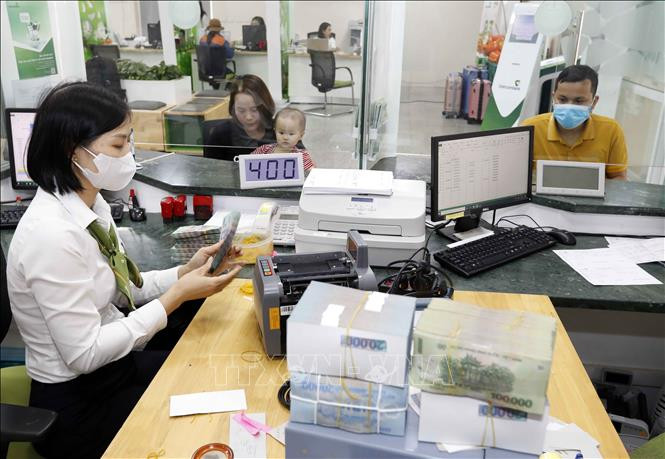According to Vietnam's public debt bulletin No. 16 for the period 2018 - 2022 just announced by the Ministry of Finance, Vietnam's public debt/GDP ratio has tended to decrease gradually in recent times.
By the end of 2022, public debt will be equivalent to 37.4% of GDP. Compared to GDP, foreign debt by the end of 2022 will be about 36.1% of GDP.

Especially in the period of 2021 - 2025, in the context of many difficulties and complexities in the country and the world, the Ministry of Finance said that the active, flexible, focused and key fiscal policy management has contributed positively to removing difficulties for people and businesses, supporting economic recovery, while still improving the state budget balance and public debt indicators.
Implementing Resolution No. 23/2021/QH15 of the National Assembly on the National Financial Plan and public debt borrowing and repayment for the 5-year period 2021 - 2025, up to now, the specific goals and quantitative targets set by the National Assembly have all been achieved.
Accordingly, in the 2021 - 2023 period, the total government borrowing reached 42.9% of the plan. The government's direct debt repayment obligation reached 53.3% of the plan. The withdrawal of government loans for re-lending is guaranteed within the limit. The average issuance term of government bonds in 2021, 2022, and 2023 ensures the target of 9 - 11 years, according to Resolution 23/2021/QH15. The growth rate of outstanding government guarantees in the following year is guaranteed not to exceed the nominal GDP growth rate of the previous year.
Government loans guaranteed for investment projects have not yet reached the net withdrawal limit. The total borrowing level of the local budget reached 26.3% of the plan approved by the National Assembly. The debt repayment obligation of local authorities reached 41.1% of the plan approved by the National Assembly. The debt safety indicators for each year in the period of 2021 - 2023 are guaranteed to be within the approved ceilings and safety thresholds.
Mr. Truong Hung Long, Director of the Department of Debt Management and External Finance (Ministry of Finance) commented that in the period of 2021 - 2023, public debt management has achieved some outstanding results such as ensuring public debt safety within the ceiling and warning threshold approved by the National Assembly. Ensuring the mobilization of loans for the state budget and development investment. Making full and timely debt payments, contributing to improving the national credit rating.
"In 2022, in the context of many countries having their credit ratings downgraded, Vietnam's national credit rating was upgraded by two credit rating organizations, Moody's and S&P, and Fitch maintained its credit rating," said Mr. Truong Hung Long.
According to economic experts, upgrading Vietnam's credit rating in the context of many global fluctuations and challenges is extremely positive, contributing to enhancing national prestige, creating a spillover effect for the entire economy, reducing borrowing costs for the Government, businesses and credit institutions, attracting more capital from potential investors, and making an important contribution to the country's socio-economic development.
At a recent workshop, Mr. Andrea Coppola - Chief Economist of the World Bank (WB) in Vietnam said that Vietnam has made important reforms in public debt management including strengthening the legal framework and public debt management...
However, Vietnam's public debt management still faces some difficulties such as the disbursement of public investment capital has not met the requirements and progress set, especially for ODA capital. The organization and implementation of project programs have basically met the set targets, but some projects have been implemented slowly, leading to prolonged implementation time. In addition, the pressure to increase borrowing, unfavorable conditions in the international and domestic capital markets have led to increased interest rates, and policy responses from countries have also put pressure on the devaluation of the Vietnamese Dong, affecting debt repayment obligations, especially for USD debt, and risks to the implementation of public debt safety indicators and national foreign debt.
Therefore, to strengthen management and effectively implement the public debt borrowing and repayment plan for the 2024-2025 period, the Ministry of Finance recommends that the Government report to the National Assembly to continue perfecting institutions and policies on state budget management and public investment, in sync with perfecting the public debt management framework, including overcoming barriers and obstacles and creating favorable conditions to accelerate implementation and disbursement progress; improve the efficiency of public investment projects; form a unified debt management agency in the Government and the Ministry of Finance in accordance with Resolution 07-NT/TW on solutions to restructure the state budget and manage public debt in 2016.
According to Mr. Andrea Coppola, Vietnam needs to reform its institutions to facilitate public debt mobilization, thereby supporting the development of the domestic capital market and contributing to effective budget management.
According to Tin Tuc newspaper